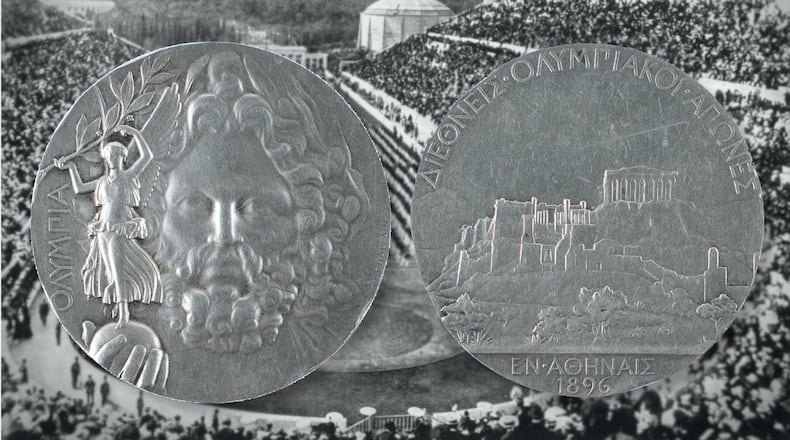There are two ways to get an Olympic gold medal: Train for years, sweat and sacrifice. Or get out your wallet.
Earlier this month a gold medal from the 1996 Atlanta Olympics came to auction and was snapped up for $19,250.
The medal was won by a member of the Nigerian football team (soccer, to you Americans), a team that defied expectations and defeated the better-known Brazilian and Argentinian teams to win Nigeria’s first Olympic football gold.
The win was a great moment for Nigeria, which hadn’t won any gold medals in 44 years. Created by Reed and Barton, the medal shows a “Seated Victory” on one side, with the Colosseum in the background, and on the reverse side, the Atlanta logo, a pictogram of a soccer player and Atlanta’s stylized “quilt of leaves” design.
Collectors of Olympic memorabilia have created a brisk demand for Olympic medals, a demand that intensifies during Olympics years. The Tokyo Olympics pumped up interest in Olympic memorabilia this summer, according to results of a twice-a-year sale at RR Auction in Boston.
To show you how quickly memorabilia passes from the hands of participants to buyers, this Boston auction also offered an official Tokyo torch from the torch relay, which was interrupted last year and completed this year. It sold for $18,529.
The Atlanta medal wasn’t the most coveted hardware at the Boston auction. Even more attention was directed toward a first-place medal from the first modern games, which took place in 1896 in Greece.
During those games, there was no gold. First place medals were silver, second place were bronze, and there were no medals for third place finishers.
This particular first-place medal went for $180,111, according to Bobby Livingston, senior vice president at RR Auction.
The front depicts a relief portrait of Zeus holding Nike, the goddess of Victory, in the palm of his hand, and the back includes an image of the Parthenon.
Other items available at the July auction included medals from the 1984 games in Los Angeles, from London in 1948, Rome in 1960 and Beijing in 2008.
“My favorite” from the auction that just ended, said Livingston, was a medal won by Swedish wrestler Ivar Johansson at the 1932 Games in Los Angeles.
The highly-motivated Johansson won gold as a middleweight, then quickly lost 11 pounds over two days and won the gold in the welterweight competition as well. That, said Livingston, was a very dedicated wrestler.
The medals come on the market, said Livingston, because Olympic athletes, despite being citius, altius and fortius are not always the wealthiest.
Olympians from less prosperous countries — or countries that have no professional sports to speak of — are often willing to part with their precious bullion if they need to put food on the table, he said.
RR Auction (it stands for “Rare and Remarkable”) derives about 5 percent of its business from Olympic memorabilia. It also handles baseball cards, other sports memorabilia, autographs, musical instruments and rock ‘n’ roll paraphernalia.
The most expensive item sold at the July auction was a seat on the Blue Origin, Jeff Bezos’ July 20 four-man rocket ride into near space.
That prize went for $28 million to an anonymous bidder, who then postponed redeeming it in exchange for a seat on a later flight.
A private letter from Albert Einstein to another physicist (in which Einstein used the phrase E=MC²) sold for $1.2 million.
Expect a new wave of Olympic items to enter the market after Tokyo’s closing ceremonies, generating thrills for Olympic collectors, a small but driven group, said Livingston. “They are passionate.”
About the Author
The Latest
Featured



